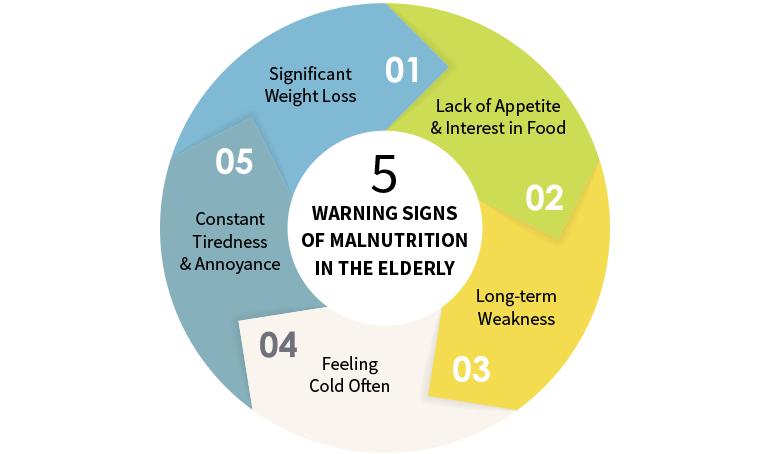Subscribe to get weekly insights
Always stay up to date with our newest articles sent direct to your inbox
Published on 31 Aug, 2022
Updated on 21 Feb, 2025
4439 Views
5 min Read

Written by Care Health Insurance
favorite0Like
favoriteBe the First to Like
Contrary to the misbelief, malnutrition does not only result in weight loss but also weight gain. Any disbalance in the nutrient intake, whether excess or lack of it, can cause malnutrition in people. That’s why diet is touted as the most critical factor that determines your health status. When it comes to older adults, there are bigger questions concerning their diet. How much and which food items to consume and how often? What are the physical signs of malnutrition in adults, and how to prevent it?
We have tried to shed light on all the concerns surrounding malnutrition in the elderly. Read on to know its symptoms with some quick tips for prevention.
Malnutrition is a condition that occurs when a person doesn't get enough of the proper nutrients their body needs to stay healthy and function properly. It can happen when a person needs to eat more food or doesn't eat a balanced diet with various foods.
When someone is malnourished, their body may not get enough vitamins, minerals, proteins, carbohydrates, or fats. These nutrients are essential for growth, energy, and maintaining the body's functions. Without them, a person's health can suffer.
Malnutrition can have various effects on the body. It can lead to weight loss, weakness, fatigue, and slow growth in children. It can also weaken the immune system, making it harder for the body to fight infections and illnesses. In severe cases, malnutrition can be life-threatening.
It's essential to eat a healthy and balanced diet that includes a variety of fruits, vegetables, whole grains, lean proteins, and healthy fats. This helps ensure your body gets all the nutrients needed to stay strong and healthy. If someone is experiencing malnutrition, it's important to seek medical help to address the underlying causes and receive proper treatment.
Old age means higher chances of contracting chronic diseases such as heart ailment, Alzheimer’s, dementia, and other inflammatory conditions. The rising percentage of illnesses among elders is one of the major malnutrition causes in old age. Besides, dental problems and higher doses of prescribed medicines are other reasons behind a malnourished body. For early diagnosis, let’s understand the early warning malnutrition symptoms in the elderly:

You should be concerned if the elders are experiencing a perpetual loss of weight and body mass. The reduction can constantly occur over time or as a sudden drop in body fat and muscle mass post-surgery or accident.
The causes behind weight loss in elders can be attributed to age-related health issues, such as catabolic diseases, insufficient dietary intake, increased inflammatory conditions, etc, that is danger signs of malnutrition. You should consult a doctor when the weight loss is unexplained and more than 5% in the last 6 months.
As people age, their calorie intake reduces due to lower metabolic rate and fewer physical activities than young adults. A lot of physiological changes, including lower cardiac output, hypertension, and reduced vital capacity, are responsible for the lack of interest in food among elders. Thus, if your parents or elders have suddenly outgrown their love for food, it can be a sign of malnutrition.
Old age is synonymous with weakness. The age-related loss in muscle mass and physical functions is inevitable yet controllable. The fatigue caused by chronic diseases like diabetes, heart, kidney, and liver diseases can be prevented by following a healthy lifestyle and diet plan. During malnutrition, elders experience persistent weakness in the body, followed by frequent illnesses and infections.
Due to less body fat under their skin, older adults often feel shivers. You should be concerned about this feeling of chilliness when accompanied by sudden weight loss and lack of appetite. Due to a restricted diet, elders miss out on several essential nutrients and vitamins that support an insulated body fat muscle to keep them warm.
Although fatigue and irritability are the universal companions of old age people, they can be connected to malnutrition. Older adults' bodies demand special doses of nutrients, like calcium and vitamin D, to stay active and strong. The absence of these nutrients becomes a major cause of malnutrition in the elderly.
A balanced, nutritious diet plays a vital role in subsiding the effects of malnutrition in the elderly. Here’s how you can ensure a healthy golden period for your seniors:
1) Consuming more Fortified Foods: Many packaged and processed foods are actually good for elders suffering from malnutrition. For instance, bread, cereals, eggs, soy milk, and the like add much-needed nutrients to an elder’s everyday diet. Ensure that meals have a mix of vitamin B12, calcium, potassium, and magnesium.
2) Increasing Physical Activities: As less as their body allows, senior citizens should continue indulging in light physical activities like walking, dancing for fitness, and aerobics exercise, to improve metabolism and appetite.
3) Indulging in Cooking Activities: Not only bodily changes but psychological changes, too, can result in a lack of appetite among elders. To solve this, elders should take part in cooking activities, like picking their veggies, socialising over meals, etc.
4) Avoiding Emotional Drainage: A stressful and pressurising environment can take a toll on the health and diet of elders. So, make sure their health and finances are well-maintained while avoiding tense conversations while taking meals.
There are two primary types of malnutrition: undernutrition and overnutrition.
Making changes to the diet of elders is as taxing as it gets. By the age of 50 years, older adults have formed a certain pattern of lifestyle and dietary habits that seem hard to shift. Resultant, old age-related illnesses are difficult to prevent and bear.
At Care Health Insurance, we ensure that older adults get their fair share of nursing care and financial support with our specially designed – ‘Health Insurance for Senior Citizens.’ The health insurance policy packs essential benefits like COVID treatment, pre and post-hospitalisation, annual health check-ups, daycare treatment, domiciliary treatment, and more. So, secure the golden years of your parents against the consequences of malnutrition in the elderly with our valuable health covers.
>> Also Read: 5 Nutrients That Will Protect Your Eyes
Disclaimer: You should consult a physician before implementing any dietary changes and prevention tips. Read the policy documents carefully to verify the benefits and inclusions.
favoriteBe the First to Like
Thyroid : मामूली नहीं हैं महिलाओं में थायराइड होना, जानें इसके लक्षण और घरेलू उपचार Vipul Tiwary in Diseases
शुगर कंट्रोल कैसे करे? जानें, डायबिटीज में क्या खाना चाहिए Vipul Tiwary in Health & Wellness
हाई ब्लड प्रेशर को तुरंत कंट्रोल कैसे करें? देखें इसके उपाय Vipul Tiwary in Diseases
पैरों में दर्द किस कमी से होता है? जानें, इसके घरेलू इलाज Vipul Tiwary in Health Insurance Articles
Neglecting Oral Health and Hygiene? Your Brain Could Suffer the Consequences Jagriti Chakraborty in Mental Health
Unlock Your Health: Protein Powder for Women and Key Supplements Jagriti Chakraborty in Diet & Nutrition
Forget Yoghurt: 8 Probiotic Foods That Actually Work Jagriti Chakraborty in Health & Wellness
BIG Update: Nipah Virus Is Back, Here’s How to Stay Safe! Sejal Singhania in Health Insurance Articles
Always stay up to date with our newest articles sent direct to your inbox
Loading...